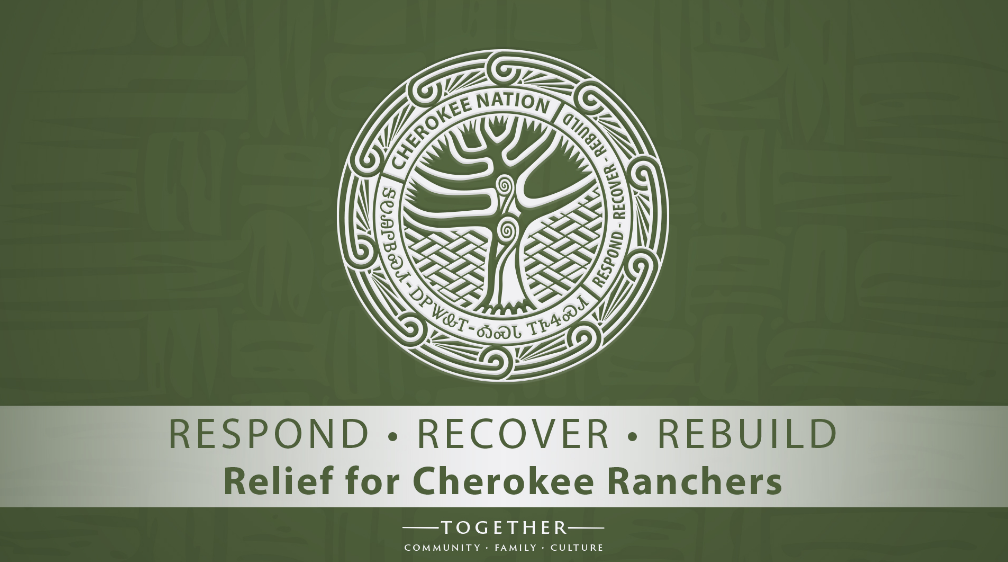
- Details
- By Chuck Hoskin Jr
Like most of Oklahoma, the Cherokee Nation Reservation is facing a historic drought. Over 90% of Oklahoma is experiencing severe to extreme drought, according to the National Drought Monitor. Cherokee farmers and ranchers need relief, so Cherokee Nation is offering a new program to provide financial help.
The million-dollar Relief for Cherokee Ranchers program will serve up to 2,000 ranchers – one per Cherokee household – with a one-time payment of $500 to mitigate the cost of buying and hauling hay. Right now, there’s little to no grass for livestock, and local ranchers have been selling off their herds to survive.
We will fund the Relief for Cherokee Ranchers program under our Respond, Recover and Rebuild Plan (RRR), funded by the federal American Recovery Plan Act. That first RRR budget passed with only one dissenting vote, an overwhelming mandate that prepared us for today’s challenges. Cherokee Councilman Rex Jordan said it best: “When the Council reviewed and approved the first ARPA budget in May 2020 by a vote of 16-1, little did we know that it would set the stage for stepping up for our farmers and ranchers today in their time of need.”
Working herds and earning a living off the land is deeply engrained in Cherokee culture. Sadly, pastures in northeast Oklahoma are simply burned up, and it is heartbreaking to see the damage and hear the personal stories of how this drought is threatening Cherokee families.

That is why we have also expanded our collaboration with the U.S. Department of Agriculture (USDA) to amplify their programs and resources for Native agriculture producers. Recently, Cherokee Nation hosted a daylong information session with the USDA to explain federal programs that can help with home loans, business supports, water infrastructure and drought relief for ranchers and small-business owners. The USDA is a powerful agency that can bring a great deal of funding to help both Cherokee and non-Cherokee farmers in our region.
Through this difficult time and beyond, Cherokee Nation is focused on strengthening our agriculture industry and providing avenues for Cherokee Nation citizens to succeed in agriculture. Our experiences during the COVID-19 pandemic emphasized how important food sovereignty and universal food access are for the livelihoods, health and well-being of the Cherokee people.
There are approximately 80,000 American Indian agricultural producers in the United States, and many are Cherokee. Historically, these producers are underrepresented in the agriculture industry and often lack adequate resources to expand and grow their operations. Native agriculture producers have disproportionately experienced negative impacts related to the pandemic, including rising costs, difficulty exporting goods and fewer financial resources to mitigate the negative effects of the pandemic.
The “Relief for Cherokee Ranchers” applications will open on the Gadugi portal starting Monday, Aug. 8, and will be funded on a first-come, first-served basis. Once the allocated budget is expended, the program will end. Candidates must live within the Cherokee Nation Reservation and currently be impacted by the hay shortage.
All applicants can apply at https://gadugiportal.cherokee.org/ and will be asked for support documents to be reviewed for eligibility. Since 2020, the Cherokee Nation administration and the Council of the Cherokee Nation have worked collaboratively to provide more than $750 million in direct financial assistance to Cherokee citizens. Now we have a responsibility to step up for our farmers and ranchers in their time of need.
Chuck Hoskin, Jr. is the principal chief of the Cherokee Nation.
More Stories Like This
Technology Rooted in Tradition is Strengthening Cherokee NationThe Lumbee Tribe of North Carolina: #575
Tribes Do Not Need a Greenlight to Build Renewable Energy
Law Should Not Get in the Way When "Manifest-ing Destiny"
Celebrating 35 Years of Gaming Success
Help us defend tribal sovereignty.
At Native News Online, our mission is rooted in telling the stories that strengthen sovereignty and uplift Indigenous voices — not just at year’s end, but every single day.
Because of your generosity last year, we were able to keep our reporters on the ground in tribal communities, at national gatherings and in the halls of Congress — covering the issues that matter most to Indian Country: sovereignty, culture, education, health and economic opportunity.
That support sustained us through a tough year in 2025. Now, as we look to the year ahead, we need your help right now to ensure warrior journalism remains strong — reporting that defends tribal sovereignty, amplifies Native truth, and holds power accountable.
 The stakes couldn't be higher. Your support keeps Native voices heard, Native stories told and Native sovereignty defended.
The stakes couldn't be higher. Your support keeps Native voices heard, Native stories told and Native sovereignty defended.
Stand with Warrior Journalism today.
Levi Rickert (Potawatomi), Editor & Publisher

